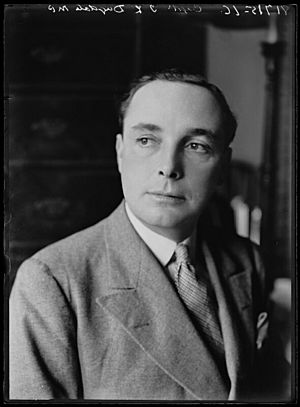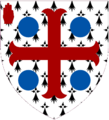Thomas Dugdale, 1st Baron Crathorne facts for kids
Quick facts for kids
The Lord Crathorne
TD PC
|
|
|---|---|
 |
|
| Minister of Agriculture and Fisheries | |
| In office 5 November 1951 – 28 July 1954 |
|
| Prime Minister | Winston Churchill |
| Preceded by | Tom Williams |
| Succeeded by | Derick Heathcoat Amory |
| Lord Commissioner of the Treasury | |
| In office 28 May 1937 – 12 February 1940 |
|
| Prime Minister | Neville Chamberlain |
| Preceded by | Sir Archibald Southby |
| Succeeded by | Patrick Munro |
| Member of the House of Lords Lord Temporal |
|
| In office 9 October 1959 – 26 March 1977 Hereditary Peerage |
|
| Preceded by | Peerage created |
| Succeeded by | The 2nd Lord Crathorne |
| Member of Parliament for Richmond |
|
| In office 30 May 1929 – 18 September 1959 |
|
| Preceded by | Sir Murrough John Wilson |
| Succeeded by | Timothy Kitson |
| Personal details | |
| Born | 20 July 1897 |
| Died | 26 March 1977 (aged 79) |
| Political party | Conservative |
Thomas Lionel Dugdale, 1st Baron Crathorne (1897–1977), also known as Sir Thomas Dugdale, was a British politician from the Conservative Party. He is remembered for resigning from his government job because of something called the Crichel Down Affair. This event is often used as an example of how government ministers are expected to take responsibility for their department's actions.
Contents
Early Life and Military Service
Thomas Dugdale was born on July 20, 1897. His family lived at Crathorne Hall in Yorkshire, England. His grandfather, John Dugdale, bought the Crathorne estate in 1844.
Thomas went to Eton College, a famous school, and then to the Royal Military College, Sandhurst, which trains army officers. He joined the Army in 1916. He fought in both the First World War and the Second World War.
Political Journey
In 1929, Thomas Dugdale became a Member of Parliament (MP) for Richmond, a region in North Yorkshire. He held this position until 1959.
During his time in Parliament, he worked as a special assistant to several ministers, including Stanley Baldwin, who was Prime Minister. He also served as a Deputy Chief Whip, which means he helped make sure party members voted the way their party wanted. Later, he became the leader of the Conservative Party and also led the party's committee on farming. In 1945, he was given the title of a baronet for his public service.
The Crichel Down Affair Explained
When the Conservative Party won the election in 1951, Winston Churchill made Thomas Dugdale the Minister of Agriculture and Fisheries. This job meant he was in charge of farming and fishing for the country.
The "Crichel Down" was a piece of farmland in Dorset that the government had bought during the war for defense. After the war, a man named Commander George Marten wanted to buy the land back. It had belonged to his wife's family. However, the Ministry of Agriculture wanted to keep the land for experimental farming, especially since there was still food rationing at the time.
Commander Marten had powerful friends and created a lot of fuss about the issue. This led to a public investigation. The investigation criticized the Ministry of Agriculture for how it handled the situation.
Finally, in 1954, Thomas Dugdale announced that Marten could buy his land back. He then told the House of Commons that he was resigning from his job as Minister.
Why Thomas Dugdale Resigned
Thomas Dugdale's resignation became famous as an example of a minister taking responsibility for the actions of the people working in his department, even if he didn't directly cause the problem. This idea is called "individual ministerial responsibility."
However, papers released years later showed that Dugdale had actually known about and approved of his department's actions. It also turned out that the investigation itself might have been unfair.
After his resignation, in 1959, Thomas Dugdale was given the title Baron Crathorne. This meant he became a member of the House of Lords, the upper house of the UK Parliament. He then continued his political work, helping to build connections with politicians in NATO and the Council of Europe.
Family Life
Thomas Dugdale married Nancy in 1936. They had a son named James. Thomas Dugdale passed away in March 1977, at the age of 79. His son James then became the 2nd Baron Crathorne.
Images for kids
 | Delilah Pierce |
 | Gordon Parks |
 | Augusta Savage |
 | Charles Ethan Porter |



